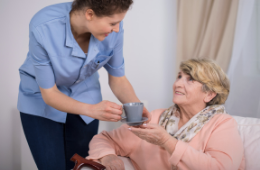
National Office
Please enter the office location/term above to receive results for your closest office as well as information matches
I was recently asked to comment on the standard of training in the home care sector for an article by homecare.co.uk with particular emphasis on how training can improve the public perception of care in this country. Here is the article:
Home care providers should be required to demonstrate their quality when registered to practice, advises the co-founder of family-run Radfield Home Care, Dr Hannah MacKechnie, who calls for a new industry accreditation to be introduced.
Reflecting on how care training initiatives have developed over the last five years, Dr MacKechnie has reached the conclusion that such a commitment is ideal for safeguarding quality of service, as well as helping the care industry to see public confidence in its performance restored.
Perception of care
Although keen to point out that care abuse scandals, which have received heightened media attention over the last few years, are isolated cases, Dr MacKechnie accepts that the public’s image of care has taken a bruising and hopes that renewed commitments to quality can assist providers in rejecting any negative misconceptions of what is largely a high-performing industry.
On the reputation of the profession, she comments: “With an ageing population and medical breakthroughs seeing people live longer than ever before, the quality of care provided to the elderly has become a talking point both politically and through the media over the past few years. A number of undercover media investigations and reports have exposed a number of abuse and neglect cases, which have unfortunately impaired the reputation of responsible carers, and as a result, more families are expecting care providers to demonstrate a higher quality service when supporting their loved ones.”
Keen to repair this damage, Dr MacKechnie recommends setting out a new accreditation, as well as insisting that the sector look to the quality of its care training programmes in order to ensure the competence and professionalism of current and future employees.
“The social care sector is set to become even more vital going forwards and, to ensure individuals receive a high-quality service from skilled staff, training should be a top priority. In order to provide an excellent service, it’s essential carers are more attuned with the people they care for, and introducing training for a wide-range of issues can help this. I’d also suggest that an industry accreditation is introduced where care providers are required to demonstrate the quality of service they offer, so service users and families can rest assured the skills and expertise of those caring for them have been recognised on a national scale.”
Benefits of personalisation

Important steps have been taken over the last few years, however, in spite of well-publicised failures in service, with Dr MacKechnie believing that service users and their families can feel far more secure on issues of well-being. This is largely thanks to care training programmes now being directed towards teaching professionals to get to know the needs of the individual, adapting their ability to suit each client’s unique circumstances.
She continues:
“In recent years, a greater emphasis has been placed on personalisation where the support is tailored to the needs of the individuals, rather than a one-size fits all approach. This often sees carers meet with the individuals and their families to draw up a care plan that enables them to receive the support they need, whilst retaining their independence and dignity.”
Tied in closely with this drive is the need to understand the challenges of caring for individuals with memory loss, with the increasing number of adults diagnosed with dementia likely to prove the central challenge in the years and decades ahead. “Dementia care in particular,” she says, “is a service that has become more needed, with the number of those living with the condition steadily increasing. Many carers now undertake specialist training to support those living with dementia to enable the individual to continue to live independently at home with dignity.”
Looking forward, Dr MacKechnie believes training programmes should extend to incorporate more sensitive needs and a broader understanding of particular care challenges.
She says:
“Although there are no formal qualifications required to become a care worker, some care providers undertake rigorous training with their staff, developing their skills and improving their overall knowledge when caring for an elderly individual. This in turn, has seen more firms increase the services they provide with rehabilitation, palliative care, and the ability to administer medication more prominent than before. It’s this advanced knowledge that enables carers to provide a more in-depth service that ever before, and offers families the reassurance that a highly-trained compassionate individual is caring for their loved ones.”
Get in touch with your local Radfield Home Care office today and find out more about the support we offer and the difference we can make.